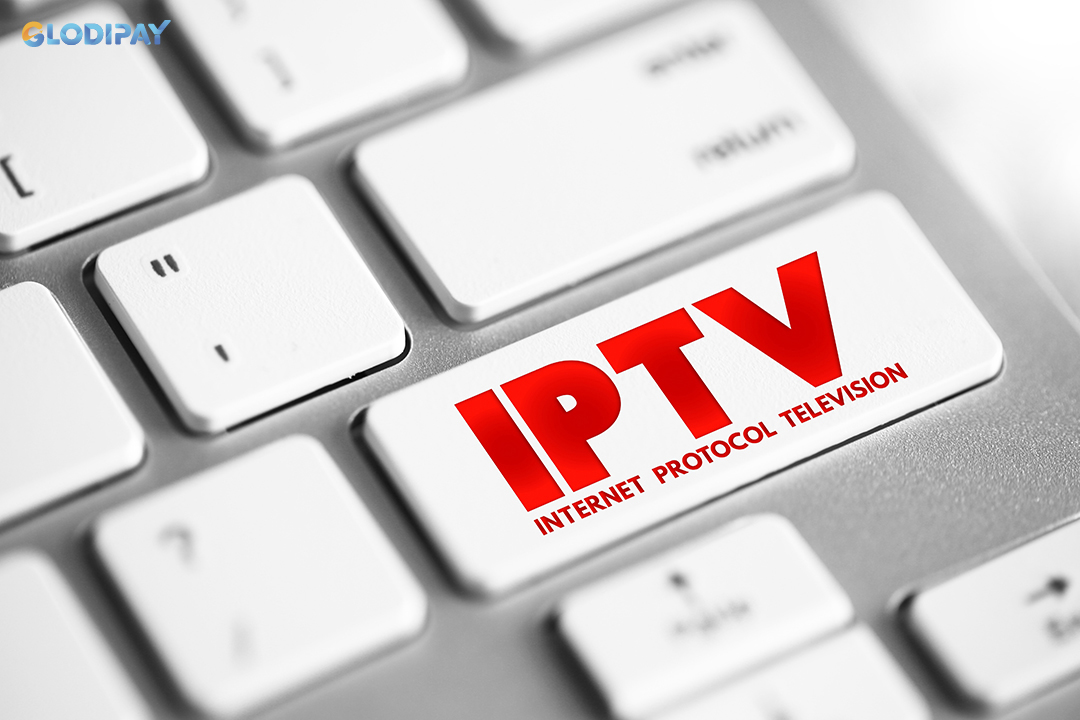IPTV (Internet Protocol Television) has seen rapid growth in recent years. It transforms how audiences consume content through live streaming, on-demand programming, and internet-based broadcasting. As this industry continues to expand, its unique characteristics, such as subscription models, international content delivery, and evolving legal frameworks, have led many financial institutions to classify it as high-risk. This classification brings significant challenges, especially in securing stable payment processing, managing chargebacks, and maintaining consistent revenue streams. In this article, GLODIPAY takes a closer look at what IPTV is, why it faces such hurdles, and explore effective payment solutions that help IPTV businesses scale with confidence.
What is IPTV and why it matters in today’s digital economy
IPTV, or Internet Protocol Television, is transforming the way audiences consume video content. Unlike traditional cable or satellite services, IPTV delivers media over the internet, offering users more flexibility and control. From live TV streaming to on-demand video and time-shifted programming, IPTV enables viewers to access content anywhere, anytime, across multiple devices.
The appeal of IPTV lies in its personalized experience. Users can pause, rewind, or rewatch content, subscribe to curated channels, and avoid the limitations of scheduled broadcasting. For content creators and media providers, IPTV opens up global markets, enabling direct delivery to viewers without intermediaries.
As IPTV continues to grow rapidly and attract a global audience, competition among providers is also intensifying. To stay ahead, IPTV businesses must deliver seamless user experiences, especially when it comes to payment convenience, speed, and security. With rising customer expectations, providers can no longer afford outdated or unreliable payment systems. Meeting these demands requires advanced payment solutions that not only enhance customer satisfaction but also support the unique operational challenges of the IPTV model.

IPTV, or Internet Protocol Television, is transforming the way audiences consume video content
Why IPTV is considered high-risk by payment processors
IPTV providers face unique challenges that traditional businesses don’t. These include legal uncertainty, fraud, and a high volume of cross-border and recurring payments. Let’s break down why financial institutions often hesitate to support IPTV platforms.
Legal and regulatory complexities
Many IPTV providers operate in a legal gray zone. Licensing agreements, content distribution laws, and intellectual property regulations vary by country and change frequently. Even legitimate IPTV services are often scrutinized due to the prevalence of illegal streaming platforms within the same ecosystem.
Payment processors must weigh the legal risks involved, especially if there’s any potential for association with unauthorized content. These complexities deter many mainstream financial institutions from offering payment services to IPTV companies.
High chargeback rates and fraud risk
IPTV services often offer free trials, auto-renewing subscriptions, or short-term plans. These practices, while common in the industry, lead to a higher incidence of chargebacks. Consumers may dispute charges if they forget to cancel a subscription, are unhappy with service quality, or don’t recognize the transaction.
Additionally, IPTV platforms are frequently targeted by fraudsters using stolen credit card information to purchase access. This not only harms legitimate customers but also increases the platform’s chargeback ratio, further damaging its standing with payment providers.
International transactions and revenue instability
Most IPTV platforms cater to global audiences, handling payments from various countries and currencies. This introduces challenges related to currency conversion, cross-border regulation, and differing customer expectations. Moreover, IPTV businesses often experience fluctuating revenue due to subscription cycles, churn rates, and seasonal promotions. All factors that traditional banks may perceive as financially unstable.

IPTV is considered high-risk by payment processors
IPTV providers need a specialized payment gateway
Given the elevated risk profile of the IPTV industry, using a traditional payment gateway is not a viable long-term option. A specialized payment gateway, built to accommodate industries with complex financial operations, is essential for sustaining and scaling an IPTV business.
Secure and reliable transaction processing
Specialized payment gateways ensure smooth, real-time processing of global transactions without interruptions. These systems are equipped to handle the specific payment flows of IPTV services, such as auto-renewals and in-app purchases.
Advanced fraud detection and prevention
To mitigate fraud risks, specialized gateways employ machine learning algorithms, device fingerprinting, IP tracking, and velocity checks. These systems flag suspicious activities early and help IPTV businesses avoid costly chargebacks and penalties.
Multi-currency and payment method support
IPTV businesses serve audiences in different countries and must offer payment methods tailored to local preferences. A good specialized gateway supports credit cards, e-wallets, direct bank transfers, and alternative methods like crypto or mobile money, along with real-time currency conversion.
Chargeback protection and dispute management
An efficient specialized gateway provides proactive chargeback alerts, comprehensive dispute documentation, and automatic reprocessing features. This helps IPTV providers minimize losses and maintain healthy processor relationships.

A high-risk payment gateway, built to accommodate industries with complex financial operations, is essential for sustaining and scaling an IPTV business
GLODIPAY - Ideal payment gateway for IPTV businesses
GLODIPAY offers a powerful and flexible payment solution designed to meet the unique needs of IPTV providers. With support across 173+ countries and multi-currency capabilities, it allows IPTV businesses to operate seamlessly on a global scale. The platform accepts a wide range of payment methods, including credit cards, e-wallets, and even USDT, while maintaining top-tier security through 3D Secure technology and full PCI-DSS compliance.
What makes GLODIPAY particularly valuable for IPTV is its strong support for high-risk verticals. It accepts IPTV businesses without strict demands on licensing, content ownership, or traffic volume, making it especially suitable for platforms navigating complex regulatory environments. Additionally, GLODIPAY provides a highly adaptable recurring billing solution that matches the subscription-based nature of most IPTV services.
The platform is also designed for transparency and speed. With a clear, optimized fee structure and a fast onboarding process, IPTV businesses can launch and scale their operations quickly without unexpected delays. This combination of flexibility, global reach, and industry alignment makes GLODIPAY an ideal partner for IPTV platforms looking to grow securely and efficiently.

GLODIPAY is the ideal payment gateway for IPTV businesses
IPTV is rapidly transforming how users consume content, but its growth brings increased competition and rising customer expectations, especially around payments. Copyright concerns, chargebacks, and cross-border transactions often classify IPTV as high-risk, making payment processing a major hurdle. To stay competitive, providers need specialized gateways like GLODIPAY that offer secure, flexible, and scalable solutions tailored to IPTV's unique needs. Contact GLODIPAY today to get the earliest support for your IPTV.

